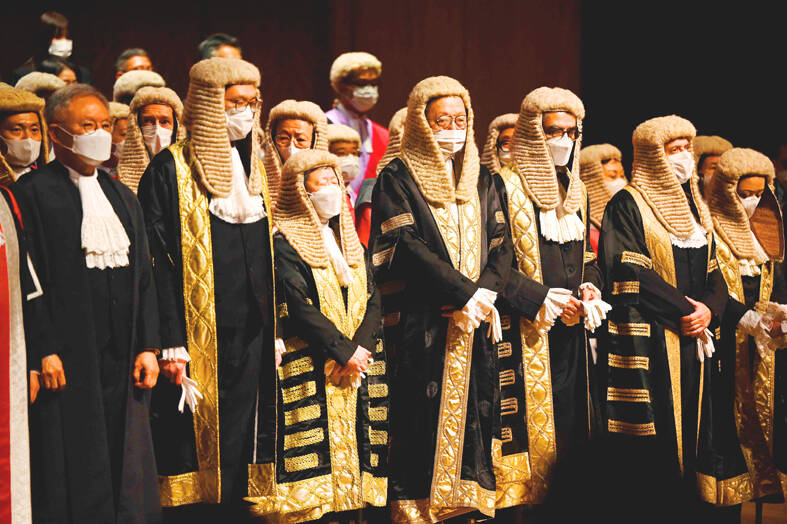A Hong Kong court on Friday sentenced a student to two months imprisonment for sedition over pro-independence social media posts she published while studying in Japan.
This is the first known Hong Konger convicted under the colonial-era sedition law over online speech in Japan.
Scholars and overseas activists say this case represents an alarming escalation of the chilling effect experienced by those who continue to engage with Hong Kong affairs.

Photo: AFP
Hong Kong Chief Magistrate Victor So (蘇惠德) sentenced the student to two months in jail after her guilty plea, saying deterrent sentencing was needed because “ignorant people would be incited subtly.”
Mika Yuen, 23, pleaded guilty to sedition late last month for 13 pro-Hong Kong independence social media posts on Facebook and Instagram shared from September 2018 to March this year.
According to the prosecutor, most of the posts were published when she was studying in Japan, with messages saying: “I am a Hong Konger; I advocate for Hong Kong independence,” and “Hong Kong independence, the only way out.”
Among the 13 alleged social media posts, only two posts were shared from Hong Kong.
She was arrested in March after returning to the city to renew her identity card.
The defense had earlier disputed whether the magistrate’s court had extraterritorial jurisdiction over the posts she published abroad, but they abandoned the dispute as Yuen did not remove the content.
Sedition is punishable by a maximum jail term of two years upon conviction. It is not among the offenses criminalized by the Beijing-imposed National Security Law, but it has been ruled by the Hong Kong Court of Final Appeal as an act that can endanger national security.
In related news, a US bill was introduced on Thursday calling for sanctions against 49 Hong Kong officials, judges and prosecutors involved in national security legal cases.
The Hong Kong Sanctions Act is a bipartisan bid by US congresspeople in the US House of Representatives and the Senate. It would require the US president to determine whether the Hong Kong officials named in it qualify for sanctions under existing US legislation, including the Global Magnitsky Human Rights Accountability Act and the Hong Kong Human Rights and Democracy Act of 2019.
Officials named in the bill include Hong Kong Secretary for Justice Paul Lam (林定國), Committee for Safeguarding National Security secretary-general Sonny Au (區志光), Police Commissioner Raymond Siu Chak-yee (蕭澤頤), Chief Justice Andrew Cheung (張舉能) and High Court Judge Esther Toh (杜麗冰).
In response, Hong Kong on Friday condemned the move, saying US legislators were grandstanding and trying to intimidate the city.
A city government spokesperson said that US politicians should stop acting against international law and norms of international relations and stop interfering in Hong Kong matters, which were “purely China’s internal affairs.”
Beijing imposed the National Security Law on Hong Kong in 2020 after months of pro-democracy protests.

A magnitude 7.0 earthquake struck off Yilan at 11:05pm yesterday, the Central Weather Administration (CWA) said. The epicenter was located at sea, about 32.3km east of Yilan County Hall, at a depth of 72.8km, CWA data showed There were no immediate reports of damage. The intensity of the quake, which gauges the actual effect of a seismic event, measured 4 in Yilan County area on Taiwan’s seven-tier intensity scale, the data showed. It measured 4 in other parts of eastern, northern and central Taiwan as well as Tainan, and 3 in Kaohsiung and Pingtung County, and 2 in Lienchiang and Penghu counties and 1

FOREIGN INTERFERENCE: Beijing would likely intensify public opinion warfare in next year’s local elections to prevent Lai from getting re-elected, the ‘Yomiuri Shimbun’ said Internal documents from a Chinese artificial intelligence (AI) company indicated that China has been using the technology to intervene in foreign elections, including propaganda targeting Taiwan’s local elections next year and presidential elections in 2028, a Japanese newspaper reported yesterday. The Institute of National Security of Vanderbilt University obtained nearly 400 pages of documents from GoLaxy, a company with ties to the Chinese government, and found evidence that it had apparently deployed sophisticated, AI-driven propaganda campaigns in Hong Kong and Taiwan to shape public opinion, the Yomiuri Shimbun reported. GoLaxy provides insights, situation analysis and public opinion-shaping technology by conducting network surveillance

‘POLITICAL GAME’: DPP lawmakers said the motion would not meet the legislative threshold needed, and accused the KMT and the TPP of trivializing the Constitution The Legislative Yuan yesterday approved a motion to initiate impeachment proceedings against President William Lai (賴清德), saying he had undermined Taiwan’s constitutional order and democracy. The motion was approved 61-50 by lawmakers from the main opposition Chinese Nationalist Party (KMT) and the smaller Taiwan People’s Party (TPP), who together hold a legislative majority. Under the motion, a roll call vote for impeachment would be held on May 19 next year, after various hearings are held and Lai is given the chance to defend himself. The move came after Lai on Monday last week did not promulgate an amendment passed by the legislature that

AFTERMATH: The Taipei City Government said it received 39 minor incident reports including gas leaks, water leaks and outages, and a damaged traffic signal A magnitude 7.0 earthquake struck off Taiwan’s northeastern coast late on Saturday, producing only two major aftershocks as of yesterday noon, the Central Weather Administration (CWA) said. The limited aftershocks contrast with last year’s major earthquake in Hualien County, as Saturday’s earthquake occurred at a greater depth in a subduction zone. Saturday’s earthquake struck at 11:05pm, with its hypocenter about 32.3km east of Yilan County Hall, at a depth of 72.8km. Shaking was felt in 17 administrative regions north of Tainan and in eastern Taiwan, reaching intensity level 4 on Taiwan’s seven-tier seismic scale, the CWA said. In Hualien, the